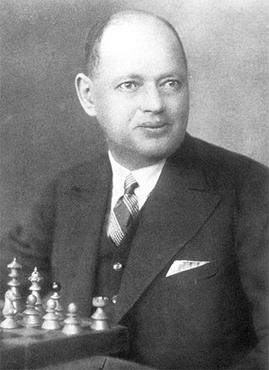Rudolf Spielmann facts for kids
Quick facts for kids Rudolf Spielmann |
|
|---|---|
 |
|
| Full name | Rudolf Spielmann |
| Country | Austro-Hungarian Empire → Austria |
| Born | 5 May 1883 Vienna, Austro-Hungarian Empire |
| Died | 20 August 1942 (aged 59) Stockholm, Sweden |
Rudolf Spielmann (born May 5, 1883 – died August 20, 1942) was a Jewish-Austrian chess player. He was known for his exciting and daring style of play. He also wrote books about chess.
Contents
A Chess Master's Journey
Rudolf Spielmann was born in 1883 in Vienna. His father, Moritz Spielmann, was a newspaper editor who enjoyed playing chess. He taught Rudolf and his older brother Leopold the game. Rudolf quickly became very good at it.
Spielmann was famous for his bold and attacking style. People called him "The Master of Attack" and "The Last Knight of the King's Gambit." His games were full of exciting moves, including sacrifices of pieces to gain an advantage. He loved to create beautiful and surprising plays on the board. For example, in a tournament in Carlsbad in 1923, he didn't have a single draw! He either won or lost every game.
Spielmann's Unique Chess Openings
Spielmann had a special love for certain chess openings. He often used the King's Gambit and the Vienna Game. He kept using these openings even when other top players stopped. He was also the last master to seriously use the Center Game. However, by the late 1920s, he started using more common openings that began with 1.d4.
Tournament Successes
Even though he played against many of the strongest chess players of his time, Spielmann did very well in tournaments. Some of his famous opponents included Alexander Alekhine, José Raúl Capablanca, and Emanuel Lasker. He won 33 of the about 120 tournaments he played in. Some of his wins include:
- Abbazia 1912 (a tournament focused on the King's Gambit)
- Stockholm 1919
- Bad Pistyan 1922
- Semmering 1926
Spielmann also wrote a famous book called The Art of Sacrifice in Chess. This book teaches players about the power of sacrificing pieces in a game.
Life During Difficult Times
Like many people of his generation, Spielmann faced many challenges because of the wars in Europe. After World War I, his tournament results became less steady. He still had brilliant wins, but he also lost games more often.
In 1934, Spielmann left Vienna because of the rising support for the Nazi party. He moved to the Netherlands. In 1938, he went to Prague to be with his brother Leopold. Sadly, the German army took over Czechoslovakia a few months later. His brother Leopold was arrested and died in a concentration camp.
Spielmann managed to escape to Sweden with the help of a friend. He hoped to travel to England or the United States. He worked hard to earn money for his journey by playing chess matches, writing chess articles, and trying to publish a book called "Memories of a Chess Master." However, World War II was happening, and some people in the Swedish Chess Federation did not like Jewish people like Spielmann. His book was never published.
Spielmann became very sad and withdrawn. In August 1942, he stayed in his apartment in Stockholm for a week without coming out. Neighbors called the police, who found him dead. The official cause was heart disease. He was buried in Stockholm, and his tombstone reads: "A fugitive without rest, struck hard by fate."
Playing Against Capablanca
Rudolf Spielmann had a unique record against José Raúl Capablanca, who was one of the greatest chess players ever. Spielmann was one of the very few players to have an even score against Capablanca, meaning he won as many games as he lost (+2 wins, -2 losses, =8 draws). He was also one of the few to win more than one game against him.
Both of Spielmann's wins against Capablanca happened after Capablanca lost his World Champion title in 1927. These wins were at Bad Kissingen in 1928 and Karlsbad in 1929. The Karlsbad tournament is often seen as Spielmann's best result. He scored 14½ out of 21 points, tying for second place with Capablanca, just half a point behind Aron Nimzowitsch.
Here is one of Spielmann's wins against Capablanca:
| a | b | c | d | e | f | g | h | ||
| 8 |

|
8 | |||||||
| 7 | 7 | ||||||||
| 6 | 6 | ||||||||
| 5 | 5 | ||||||||
| 4 | 4 | ||||||||
| 3 | 3 | ||||||||
| 2 | 2 | ||||||||
| 1 | 1 | ||||||||
| a | b | c | d | e | f | g | h | ||
- Capablanca vs. Spielmann, Bad Kissingen 1928
1.d4 d5 2.c4 c6 3.Nc3 Nf6 4.Nf3 dxc4 5.e3 b5 6.a4 b4 7.Na2 e6 8.Bxc4 Be7 9.0-0 0-0 10.b3 c5 11.Bb2 Bb7 12.Nc1 Nc6 13.dxc5 Na5 14.Ne5 Nxc4 15.Nxc4 Bxc5 16.Nd3 Qd5 17.Nf4 Qg5 18.Bxf6 Qxf6 19.Rc1 Rfd8 20.Qh5 Rac8 21.Rfd1 g6 22.Rxd8+ Qxd8 23.Qe5 Be7 24.h3 Rc5 25.Qa1 Bf6 26.Rd1 Rd5 27.Rxd5 exd5 28.Ne5 Qd6 29.Nfd3 Ba6 (diagram) 30.Qe1 Bxe5 31.Nxe5 Qxe5 32.Qxb4 Bd3 33.Qc5 Qb8 34.b4 Qb7 35.b5 h5 36.Qc3 Bc4 37.e4 Qe7 38.exd5 Bxd5 39.a5 Qe4 0–1
Famous Sayings
- Chess master Richard Réti said that Spielmann showed "amazing cleverness in tricky situations, where he felt completely at home."
- Spielmann himself believed: "A good sacrifice is one that is not necessarily perfect but leaves your opponent confused."
- He also said: "We cannot resist the excitement of sacrifice, because a love for sacrifices is part of what makes a chess player."
See also
 In Spanish: Rudolf Spielmann para niños
In Spanish: Rudolf Spielmann para niños
- List of Jewish chess players
 | Anna J. Cooper |
 | Mary McLeod Bethune |
 | Lillie Mae Bradford |

